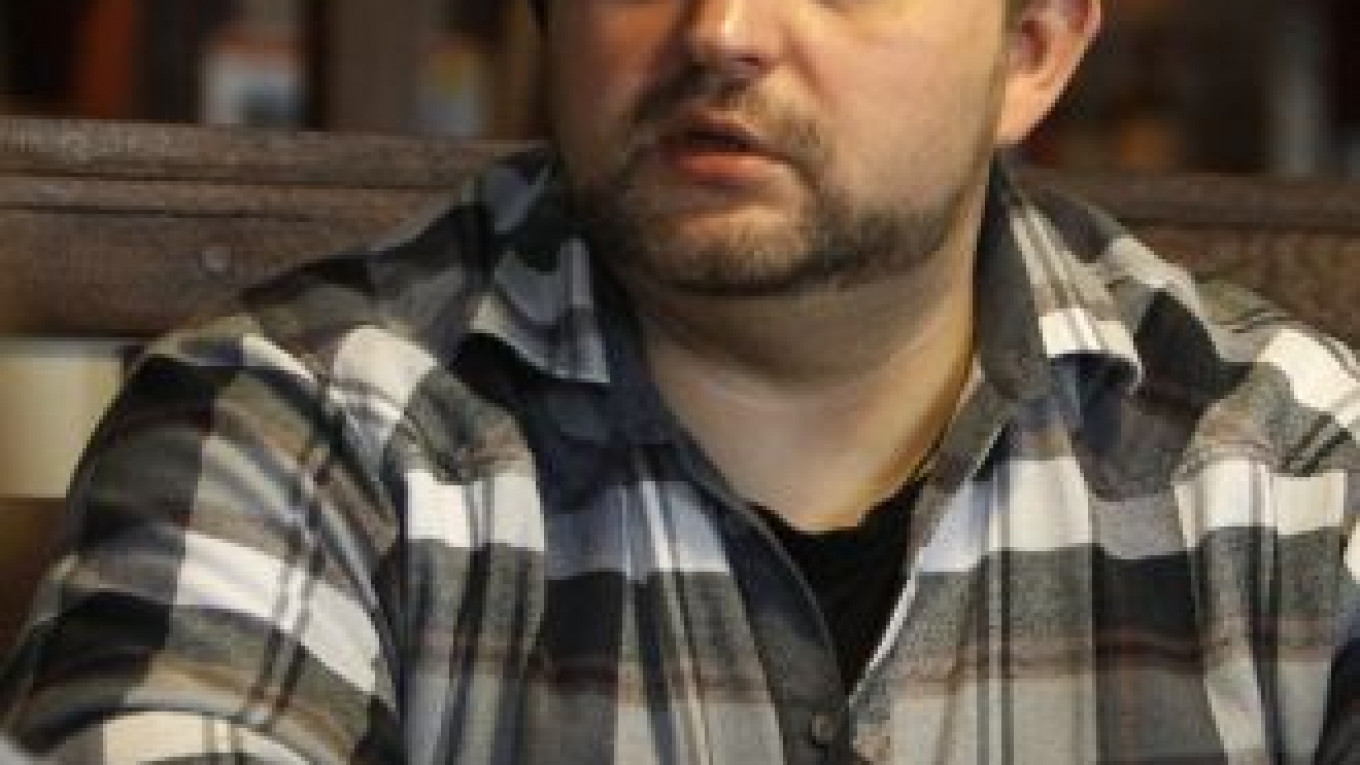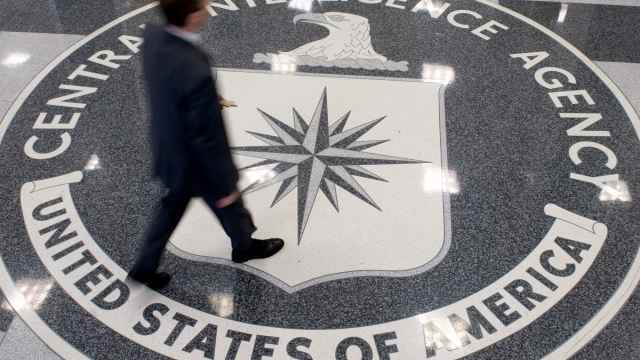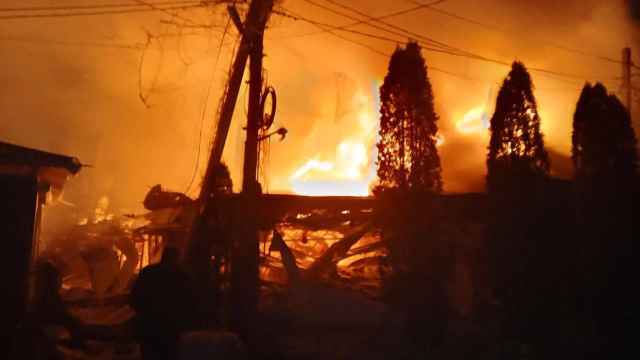KIROV, Kirov Region — Governor Nikita Belykh is the Kirov region's most powerful man, but that did not stop masked investigators from searching his office.
Police linked the raid to a fraud investigation involving a local business, but many others say the men in body armor and balaclavas who rummaged through his files were a warning from Moscow and, possibly, President Vladimir Putin himself.
The message? Toe the line, or lose your job.
As a liberal regional governor in a country led by an increasingly hawkish president, Belykh is an odd man out and fighting for his political survival.
The 37-year-old former opposition leader presents the inquiry as little more than a hazard of his job as a regional leader, not commenting on suggestions that Putin or his allies were behind it and saying he had no idea of the real motive.
"In terms of political signals, there are less expensive or complicated ways [to get at me]," he said in an interview, looking relaxed in an open-neck shirt and jeans but choosing his words carefully.
"Many governors have faced such issues," he said, referring to his role as a witness in the investigation into the sale of part of a local distillery and saying he had committed no crime.
In some ways Belykh is like Russia's 82 other regional governors, relying on his nous, contacts and knowledge of the Byzantine political system to stay in power in the drab regional capital of Kirov, 900 kilometers northeast of Moscow.
But he is one of only nine who are not members of Putin's United Russia party and is unique in having led a moderate opposition party before Putin's relatively liberal predecessor, Dmitry Medvedev, brought him in from the cold in late 2008.
When Putin first took over from Boris Yeltsin at the turn of the century, the growing post-Soviet autonomy of the regions had threatened to tear apart a federation stretching from the Baltic to the Pacific.
Back in the presidency for a third time and with some Soviet-style order reinstated, it is not so much Russia's future but Putin's at the fore.
Having his own people in charge of the regions, some of them thousands of miles from Moscow, could be crucial to Putin's ability to reassert his authority over the world's biggest country after protests in the big cities against his rule.
Liberal Experiment
Without Putin's patronage, it is all but impossible to get on in Russia, and Belykh's choice is becoming clear: to pledge allegiance to the president and disassociate himself from his former opposition comrades.
"I'm a civil servant. I'm on the president's team. I must, and will, support the course the president has chosen," the burly, bearded governor said.
He is guarded during the interview, avoiding inflammatory comments that might endanger his relationship with the Kremlin, which faces little dissent for now from opposition leaders preoccupied by criminal charges against them.
Belykh needs no reminding of his dependence in Kirov, a city named after a Bolshevik whose assassination in 1934 was used by Soviet dictator Josef Stalin as a pretext for his purges.
A display of photographs in the regional government headquarters shows Putin touring Kirov as prime minister in February 2011 with Belykh at his side.
The city of almost half a million people resembles many other towns across the country, with squat Soviet-era apartment blocks that have seen better days.
The region is down on its luck. Its timber trade is in decline, as are the military factories no longer needed for Moscow to keep up in the Cold War arms race.
Local officials put the average wage in its capital at only about 17,000 rubles ($550), considerably less than in Moscow, while the closure of arms producers, or sharp reductions in their workforce, has left some other towns with almost no jobs.
Belykh's penchant for blogging — and the smartphone on which he keeps the packed schedule of his 14-hour work day — is somewhat out of kilter in the city, whose main square is dominated by a statue of Soviet state founder Vladimir Lenin.
It also suggests a more natural link with iPad-carrying Medvedev than with Putin, who is a generation older and has embraced the digital age less enthusiastically than his protege.
Medvedev installed Belykh in Kirov, which is bigger than Hungary but accounts for only 1.5 million of Russia's 140 million people and is mostly covered by forests, to test whether liberals could be co-opted into local government.
Belykh, who had been deputy governor of the neighboring Perm region, set out tackling many problems, supporters say.
"At least you can say he's put Kirov on the map. No one knew where it was before," said Alexander Khalikov, a small businessman who praised Belykh for bringing new shops to the city and building schools, homes and sports centers.
The U.S. fast-food chain McDonald's is among newcomers to Kirov, which local people say has become more widely known across Russia because of the media glare around Belykh, although foreign investment is minimal.
But Belykh also quickly made enemies. Many local businessmen and politicians simply do not trust a man from outside the region who brought liberal aides such as Alexei Navalny, who later went on to become an opposition leader in Moscow.
"He's just like the rest of them, out for himself. What has he really done? There are no jobs for youngsters here. Physics graduates can only find work as laborers," said 77-year-old Roza Popova, carrying her shopping bags through a snowstorm.
She complained that more than a third of her 10,000-ruble monthly pension goes to her rent, and that energy prices were rising. Belykh, she said, had not done enough.
Balance Of Forces
From the first day on the job, Belykh has had to play rival business and political groups off one another in Kirov, trying on a local level to emulate what Putin does on a national scale by maintaining a balance of forces.
With a seat in Russia's upper house of parliament as a regional governor, he also travels to Moscow once a week for meetings at government ministries and other federal bodies crucial to winning government subsidies.
Kirov's annual subsidy is almost 13 billion rubles, about a third of its budget, and its financial dependence increases Putin's hold.
"The region is not self-sufficient. It's not dependent on the quality of the governor; it's dependent on the subsidies it gets," said Ilya Ponomaryov, a moderate opposition member of Russia's lower house of parliament in Moscow.
The departure from the Kremlin of his sponsor, Medvedev, and Putin's return to the presidency last May has left Belykh more vulnerable and isolated than ever. Maria Gaidar, a former aide to Belykh, declared that the "liberal experiment" in Kirov was over.
Opposition leaders saw the raid on Belykh's office as part of efforts by Putin to crack down on potential rivals, including pressing criminal charges against Navalny for alleged theft, which he denies, while working in Kirov.
The Kremlin denies launching a clampdown, saying it does not use the judiciary for political purposes.
Belykh's loyalty had already been tested with a motion by local legislators to hold a no-confidence vote on him last month that was withdrawn at the last minute.
"It was a signal from the Moscow leadership of United Russia and the presidential administration that they can do this. It was meant to shake him up," said Yevgeny Kokoulin, leader of the Kirov branch of the center-left Yabloko party, which opposes Belykh.
"If you have good relations with the state, you survive. Otherwise, you do not. Those are the rules of the game," he said.
Putin scolded Belykh in public during a meeting in January 2011 over an excessive rise in water rates in Kirov, saying he should have returned from holiday to deal with it.
The governor later hit back, saying the matter had been dealt with and defending his vacation with his children.
Belykh says he and Putin cleared the air at a meeting a few months later and describes relations as businesslike. "We have a working relationship. It's not antipathy or sympathy; we meet and discuss work. Everything is calm," he said.
But they are certainly not close. "As a rule, the presidential administration doesn't call to make any comments, and Putin himself doesn't call," Belykh said.
His main contact is a Kremlin envoy responsible for liaison with 14 central regions including Kirov, grouped into one of eight clusters of regions across the country.
Battles For Money
Asked what he saw as his main achievements as governor, Belykh said: "Building roads, gasification [of communities] and work in the social sphere. A lot has been done."
Mikhail Kurashin, a local deputy, endorsed his efforts. "There are problems, … but Nikita Belykh has given the region new impetus," said Kurashin, a deputy speaker in the Kirov parliament for the center-left Just Russia party.
But the communist deputy parliamentary speaker in Kirov, Marina Sozontova, said her party had been approached by many workers demanding that the governor resign.
"We judge him on his actions, not his words," she said in an office lined with portraits of Stalin and Lenin, and expressing disappointment with the lack of improvements in Kirov.
Key to Belykh's survival as governor is United Russia, which has a simple majority in the regional parliament. Although rivals talk of divisions in the local party branch, including over the governor, its leader still backs him.
If he can cling onto power until his term runs out at the start of next year, he must then secure approval to stay on until an election a few months later, before seeking a new term through a popular vote. It is a daunting prospect, and Belykh is realistic.
"I know how our political system works," he said.
A Message from The Moscow Times:
Dear readers,
We are facing unprecedented challenges. Russia's Prosecutor General's Office has designated The Moscow Times as an "undesirable" organization, criminalizing our work and putting our staff at risk of prosecution. This follows our earlier unjust labeling as a "foreign agent."
These actions are direct attempts to silence independent journalism in Russia. The authorities claim our work "discredits the decisions of the Russian leadership." We see things differently: we strive to provide accurate, unbiased reporting on Russia.
We, the journalists of The Moscow Times, refuse to be silenced. But to continue our work, we need your help.
Your support, no matter how small, makes a world of difference. If you can, please support us monthly starting from just $2. It's quick to set up, and every contribution makes a significant impact.
By supporting The Moscow Times, you're defending open, independent journalism in the face of repression. Thank you for standing with us.
Remind me later.






